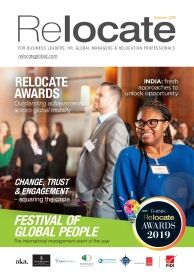How global mobility can drive a diverse and inclusive workplace
Today there is a greater awareness of diversity and inclusion in the workplace, not only in policies, but as a core component of company culture. How can companies attract and retain diverse talent?

Attracting and Retaining Diverse Talent
Recruiting is often a new hire’s first experience with an organisation, so it is important to give the right impression. Diversity is playing an increased role in recruitment – as cited by Forbes – and is proving a key competitive differentiator/advantage. To successfully attract diverse talent, all involved with the process need to understand what diversity means to a wide range of people. As an industry, relocation policies have historically been a one-size-fits-all model, yet there are huge variations in personal situations. In addition, global mobility teams can ensure they are appealing to all by making sure the relocation programme is flexible and reflective of the modern family dynamic, specific to the relocating country, including:- Single-parent employees
- Accompanying partners or adult dependents
- Spouse/partner re-employment
- Dual career families
- Single employees
- LGBTQ+ relationships
Case Study: Family and Partner Support
An employee (internally referred to as an ‘associate’) relocating with their partner/family enables them to have their support network close to them. In addition to improving the work/life balance of the employee, if they successfully transition and are settled in as quickly as possible, they are more able to focus on their assignment. Below are examples of how SIRVA helped support Capital Group’s employees with an inclusive family benefits programme:- On-site delivery support to help parents supervising young children
- In-person meets and greets
- Hotels for late-night arrivals
- Live-in partners receiving the same benefits as married couples
- Security deposit advances made for early-in-career assignees
- Cultural and language training for assignees/partners/families
- In-depth destination research, e.g. safety for assignee/partner/family
- Accommodation/care for ailing parents
- Resources for parents of children with special needs
Read more:
- Helping companies to foster a diverse and inclusive culture
- How global mobility can help recruit and retain your best talent
- Balance for Better: Government offers family-friendly guide
Assignee Compatability
There are, however, two sides to this coin: while diversity in the workforce is critical to success, this must be balanced with budgets, immigration and local culture to ensure success for the transferring assignee. Challenges may arise based on limited school options at the destination, acceptance of LGBTQ+ lifestyle in other cultures, personal safety and healthcare availability for those with dependents who need long-term or in-home care. Each of these factors, when linked to an employee’s personal situation, may drive whether the relocation opportunity is truly right for them. Therefore, it is critical that benefits and opportunities are open to all qualified employees, but everyone involved must accept that what may be a great professional opportunity, may not be the right decision for an individual or his/her family. Employees declining an assignment or relocation should not be viewed negatively, but with respect of the employee as an individual and not just a worker. Rather than just delivering a relocation package, companies must also ensure that partners and vendors share the same values and training is given where required. They must also make sure that the drive for inclusion is not just seen in policies, but among all employees. Who is informing the policies? Do these decision-makers come from a diverse background and do they understand diversity and inclusion challenges? Companies must have honest and open discussions about whether diversity and inclusion are truly being achieved – and not just seen as a box-ticking operation.Overcoming Challenges to Achieve Diversity
One way to deal with these challenges is to utilise a candidate assessment tool to educate families on the culture, laws and social mores of a particular destination and to determine whether or not that location is appropriate for them. Assessment and education at an early stage is an important step to ensure they are making informed decisions.Another way to overcome challenges in achieving diversity is by giving global mobility teams a ‘seat at the table’, so they are recognised not just as a support function, but as a strategic partner. This enables them to improve mobility decisions at higher levels within the company and demonstrates a commitment to achieve a voice for change to improve diversity and inclusion.In addition, conversations with individual employees are highly important, not only as an opportunity for global mobility teams to learn more about an assignee’s needs and the support they can offer, but as a safeguarding mission to help them better prepare for future similar relocations. These conversations can be informal or formal; topics can include child or adult care options, relocating with children with special needs, dual-career families and those moving by themselves.The flexibility of policies also needs to be made possible, as exceptions to the rule are common – no one family is the same. For example, the policy may offer childcare reimbursement during a home finding trip, but an employee may instead have a parent living with them who cannot be left alone. Flexibility allows for adult dependent care to be a reimbursable expense on a home finding trip, which is of great value to the assignee. Another example is an employee not feeling comfortable checking into a temporary housing option at night, so employers offer a hotel stay for the night of arrival, allowing the employee to move into his/her apartment during daylight hours.Summary
To conclude, fostering an environment of inclusivity can have an undoubtedly positive effect on the recruitment, involvement and retention of a diverse workforce. A workforce that is diverse offers different ideas, perspectives and experiences and encourages healthy debates, inspiring innovation. It expands employee perceptions and, as such, also increases the company’s ability to reach a more diverse customer base. A Center for Talent Innovation survey found that 48% of companies in the US with more diversity at the senior management level improved their market share the previous year. The EY study reported that 33% of employers noticed anincrease in the job performance of their assignees by offering partner support. And 85% of the CEOs surveyed by PwC, whose companies have a formal diversity and inclusiveness strategy, said it has improved their bottom line. This is because a diverse workforce brings different perspectives, helping businesses gain a well-rounded view of their market and products/ services, while providing an inclusive environment for talent to thrive.The education of staff on the true value of diversity – such as how a person’s experiences and perspectives can be of great value upon assignment and elimination of unconscious bias – helps companies to attract and retain the best talent. Global mobility teams need to offer flexibility in policies to allow programmes to be inclusive. The benefits are substantial to employees and their employers, alike.Subscribe to Relocate Extra, our monthly newsletter, to get all the latest international assignments and global mobility news.Relocate’s new Global Mobility Toolkit provides free information, practical advice and support for HR, global mobility managers and global teams operating overseas.
 Access hundreds of global services and suppliers in our Online Directory
Access hundreds of global services and suppliers in our Online Directory ©2019. This article first appeared in the Summer 2019 edition of Relocate magazine, published by Profile Locations, Spray Hill, Hastings Road, Lamberhurst, Kent TN3 8JB. All rights reserved. This publication (or any part thereof) may not be reproduced in any form without the prior written permission of Profile Locations. Profile Locations accepts no liability for the accuracy of the contents or any opinions expressed herein.
©2019. This article first appeared in the Summer 2019 edition of Relocate magazine, published by Profile Locations, Spray Hill, Hastings Road, Lamberhurst, Kent TN3 8JB. All rights reserved. This publication (or any part thereof) may not be reproduced in any form without the prior written permission of Profile Locations. Profile Locations accepts no liability for the accuracy of the contents or any opinions expressed herein.






























